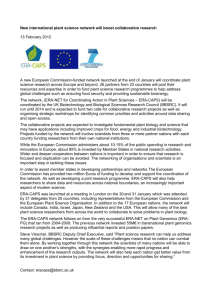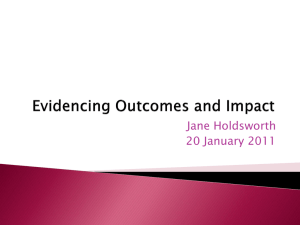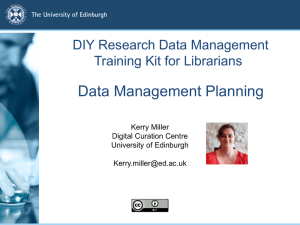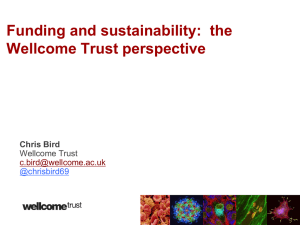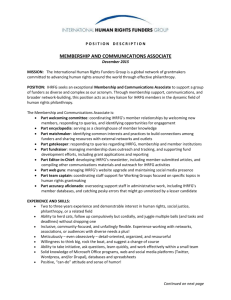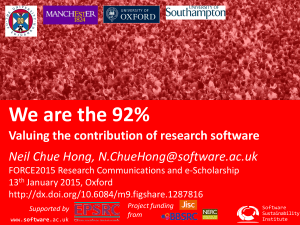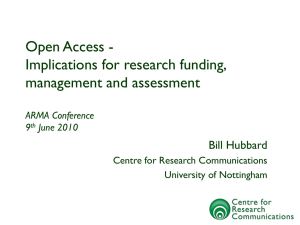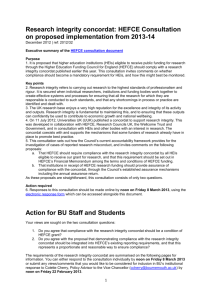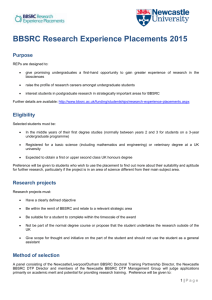Summary report - “Somebody else`s problem?” Is
advertisement
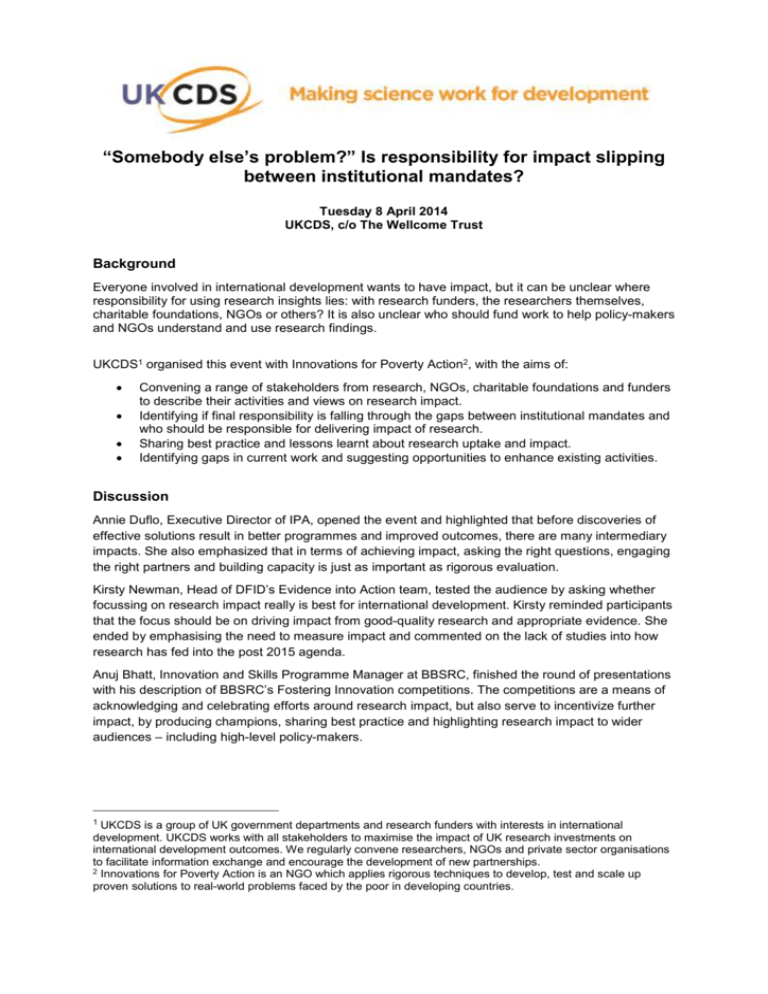
“Somebody else’s problem?” Is responsibility for impact slipping between institutional mandates? Tuesday 8 April 2014 UKCDS, c/o The Wellcome Trust Background Everyone involved in international development wants to have impact, but it can be unclear where responsibility for using research insights lies: with research funders, the researchers themselves, charitable foundations, NGOs or others? It is also unclear who should fund work to help policy-makers and NGOs understand and use research findings. UKCDS1 organised this event with Innovations for Poverty Action2, with the aims of: Convening a range of stakeholders from research, NGOs, charitable foundations and funders to describe their activities and views on research impact. Identifying if final responsibility is falling through the gaps between institutional mandates and who should be responsible for delivering impact of research. Sharing best practice and lessons learnt about research uptake and impact. Identifying gaps in current work and suggesting opportunities to enhance existing activities. Discussion Annie Duflo, Executive Director of IPA, opened the event and highlighted that before discoveries of effective solutions result in better programmes and improved outcomes, there are many intermediary impacts. She also emphasized that in terms of achieving impact, asking the right questions, engaging the right partners and building capacity is just as important as rigorous evaluation. Kirsty Newman, Head of DFID’s Evidence into Action team, tested the audience by asking whether focussing on research impact really is best for international development. Kirsty reminded participants that the focus should be on driving impact from good-quality research and appropriate evidence. She ended by emphasising the need to measure impact and commented on the lack of studies into how research has fed into the post 2015 agenda. Anuj Bhatt, Innovation and Skills Programme Manager at BBSRC, finished the round of presentations with his description of BBSRC’s Fostering Innovation competitions. The competitions are a means of acknowledging and celebrating efforts around research impact, but also serve to incentivize further impact, by producing champions, sharing best practice and highlighting research impact to wider audiences – including high-level policy-makers. 1 UKCDS is a group of UK government departments and research funders with interests in international development. UKCDS works with all stakeholders to maximise the impact of UK research investments on international development outcomes. We regularly convene researchers, NGOs and private sector organisations to facilitate information exchange and encourage the development of new partnerships. 2 Innovations for Poverty Action is an NGO which applies rigorous techniques to develop, test and scale up proven solutions to real-world problems faced by the poor in developing countries. The event’s period of open discussion then focussed on the following points: To ensure impact from research there are many different roles to be played, by a variety of actors. This means responsibility for impact cannot be reduced down to one actor but should be shared across many levels. But could a single institution take responsibility for managing these efforts? Ensuring impact from research projects is now high on most people’s agendas. It could be asked who isn’t taking responsibility? Some participants suggested, however, that at a local level in low- or mid-income countries there wasn’t sufficient accountability or buy-in for uptake of research. Responsibility for impact involves a range of partners; funders expect researchers to explore the pathways for realising impacts, and be actively involved in exploring the wider benefits of the research to the public sector, commercial private sector, third sector and/or the wider public. Researchers, institutions and funders share responsibility for evaluating and recognising impact (e.g. the REF and pathways to impact). The responsibility for achieving impact is shared by many, e.g. researchers, institutions, as well as in-country, local actors. Research uptake and its associated processes (e.g. capacity building) need to be internal and sustainable. Conventional thinking should shift from the product of research being evidence to a product of understanding. This requires translation and a focus on in-country resources. But who will fund these resources when traditional funding for research ends at programme completion? Contextual knowledge and user engagement is essential to achieving research uptake. Programmes must identify the relevant champions and influential networkers to work at all levels of the decision-making process and act as translators and connectors. Some feel that more effort should be made to ensure all international development research is of the highest quality in terms of excellence and rigour, including a need for more multidisciplinary work. Some NGOs feel that they need explaining what constitutes as quality research and evidence. Some NGOs feel they are under pressure to show impact of their work, but not the type of ‘impact’ they traditionally see as important. Many smaller NGOs do not have the resources to support capacity building or exceedingly rigorous research. Funders think that researchers have a responsibility to consider and demonstrate how they would achieve excellence with impact. The responsibility and focus on research impact should be applied at institutional level, and needs to be incorporated at project level, and both institutions and researchers are encouraged to secure impact from publicly funded research. Next steps UKCDS will consult with stakeholders on the possibility of future activities around a more focussed discussion to: Identify who would be willing to fund the activities to deliver impact and the provision of incountry resources once the traditional programme funding comes to an end. Reconvene representatives from the different sectors to share lessons learnt and best practice around research impact. Organise more feedback from policy-makers to researchers and funders on why some programmes achieve little impact. Clarify what constitutes quality research and evidence and explain the standards of excellence and rigour. The meeting was well received by participants according to the evaluation forms. Participants felt the presentations and general debate were very interesting, but that a more focussed discussion was required to tackle the issues of impact raised in the debate. This could look to answer the questions around funding for research impact and look at the tangible ways impact is perceived and measured. Participants also appreciated the opportunity to network with the range of useful contacts but sought a more interactive and participatory format for the event. Outputs from the event, including presentations, can be found at: www.ukcds.org.uk/isresponsibility-for-impact-slipping-between-institutional-mandates Attendees First name Last name Organisation Craig Anuj David Alex Susan Philip Annie Jamie Caroline Andy Clair Bill Alex Kate Qiu Yi Jeff Sabina Tamlyn Kirsty Michael Julia Vibhuti John Esther Ian Martin Bardsley Bhatt Carr Christopoulos Crane Davies Duflo Enoch Fiennes Frost Grant-Salmon Gray Gwyther Hamer Khut Knezovich Morley Munslow Newman O'Donnell Oertli Patel Seaman Thompson Thornton Walsh ESRC BBSRC The Wellcome Trust Stars Foundation UCL Institute of Global Health 3IE Innovation for Povery Action UKCDS Giving Evidence Research into Results IIED Consultant UKCDS BBSRC The Wellcome Trust IDS ARK Institute of Development Studies DFID BOND BOND Royal Society of Chemistry Evidence for Development Association of Charitable Foundations UKCDS Oxfam Jenny Wilson UKCDS
